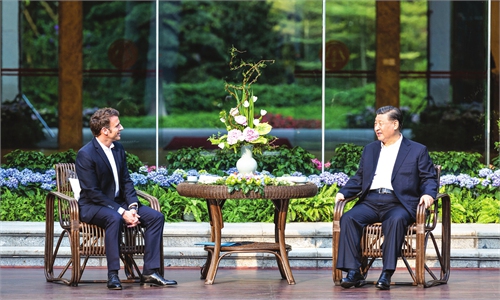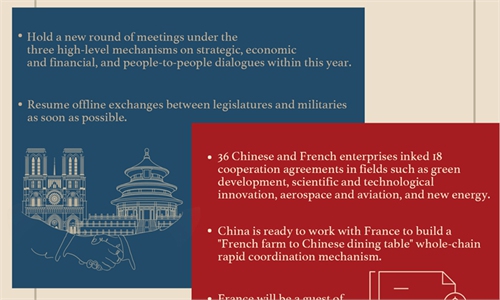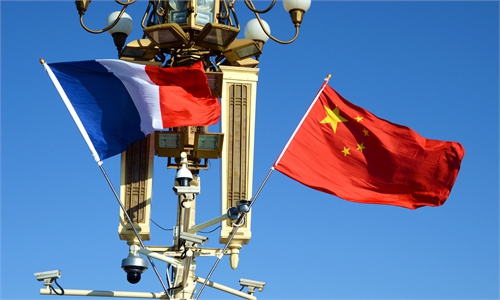ARTS / CULTURE & LEISURE
China-France joint declaration sheds light on upcoming packed culture and tourism year in 2024
Celebrating 60 years of friendship
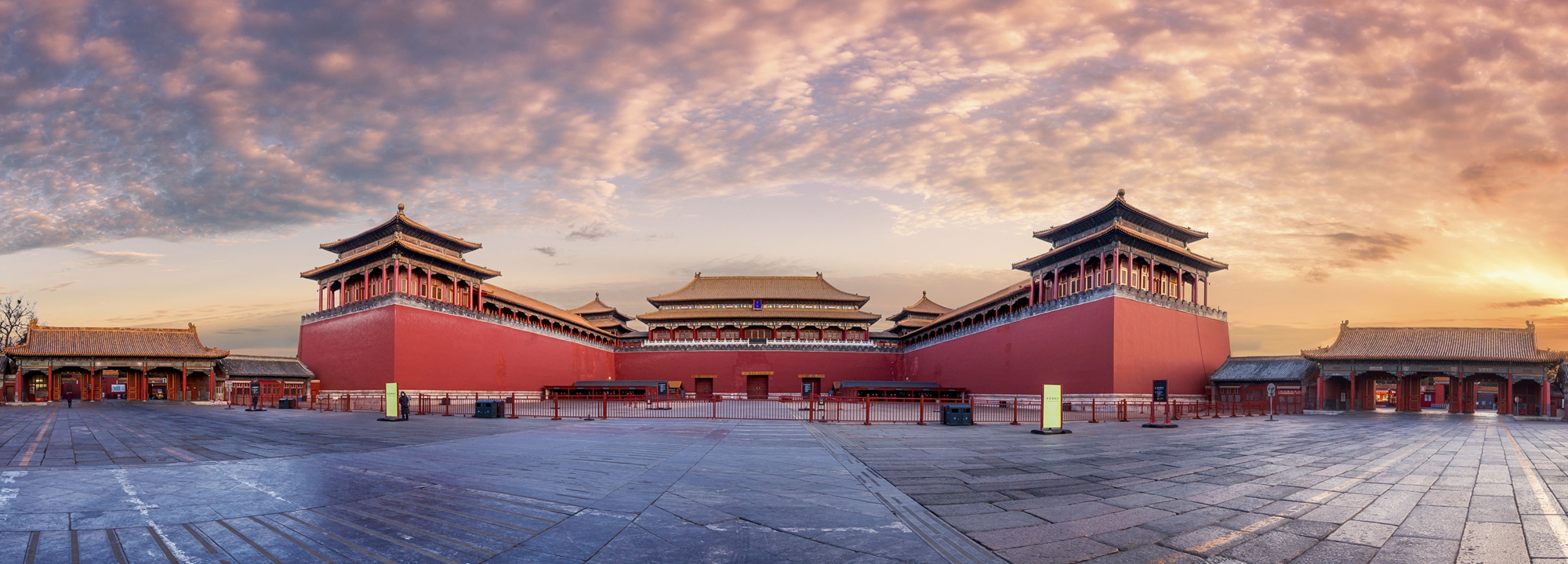
The Palace Museum in Beijing Photo: VCG
Editor's Note:
The China-France Year of Culture and Tourism in 2024 will mark the 60th anniversary of the establishment of China-France diplomatic relations. These special relations and mutual respect have helped usher in appreciation for the two countries' culture and art. The China-France joint declaration released at the conclusion of French President Emmanuel Macron's three-day state visit to China outlines exchanges in protection and restoration of cultural relics, art, education and sports, all with the aim to further deepen ties between the civilizations in the East and West. This indicates that a raft of rich cultural and people-to-people exchanges will be held in the two countries, thrilling fans of both cultures, many of whom have expressed high anticipation for the 2024 year of culture and tourism in interviews with the Global Times.
According to a recent survey "China and the World in the Eyes of the French" conducted by researchers from the Institute of National Communication Strategy at Huazhong University of Science and Technology, a majority of French people think China will become the strongest country in the world by 2050 and that China and France will be both partners and competitors.
Collected from 1,087 online questionnaires from French participants, the survey also shows that nearly 80 percent of the survey's participants expressed their willingness to travel to China for tourism, while the ratio of people willing to go to China for education reached 10.7 percent.
Chinese cultural experts told the Global Times that the joint declaration will help inject new impetus into the development of sustainable, healthy, stable and predictable China-France relations and is sure to advance the friendship between the two peoples and further promote a global community with a shared future.
"As advocates and promoters of cultural exchanges, China and France have always advocated mutual respect and learning. The declaration sets a good example for the world for equal exchanges and the harmonious coexistence of different civilizations," Yu Jinlong, a cultural critic based in Beijing, told the Global Times on Monday.
Prolific exchanges in art
The declaration has shed light on the promotion of China-France art exchanges in multiple fields such as the fine arts, museums, literature, film, publishing and digital productions.
Cultural researcher Xu Shuming told the Global Times that French art, literature and film are three sectors that have a "good foundation" in China and have the greatest potential for further development in 2024.
In the field of art, France's Palace of Versailles and China's Palace Museum are set to hold a major collaboration. The 2024 exhibition is anticipated to be a "national-level art blockbuster," Xu noted, emphasizing the historical importance of both institutions.
The exhibition, The Palace of Versailles and the Forbidden City: French-Chinese Relations in the 18th Century, is scheduled to take place from April 1 to June 30, 2024. A total of 150 items from the collection of the Palace of Versailles will be exhibited in the Palace Museum in Beijing with a focus on how ties were forged between the two nations during the 17th and 18th centuries, especially under King Louis XIV and the Kangxi Emperor with the arrival of French Jesuit priests at the Chinese court in 1685.
"High-level activities" will also be carried out between Paris' Centre Pompidou and Shanghai's West Bund Museum.
Contemporary art gallerist Qu Qiuzi told the Global Times that the use of "high-level" implies more "famous, rare, newness-oriented and large-scale" art from France will be brought to China.
In 2023, over 160 modern and contemporary artworks from the Centre Pompidou's collection were exhibited in Shanghai at the exhibition The Voice of Things. Such works were classic avant-garde, including Hat Rack from the world's most famous Dadaist artist Marcel Duchamp.
In the area of literature, publishing expert Li Ping told the Global Times that the Chinese market is a "major importer of French books" and that the literature exchange scene will thrive even more in 2024.
Li said that the French Embassy in China has played an important role in assisting China-France literature exchanges through multiple awards, adding that the growing number of French learners in China, especially students majoring in French, have "sped up" the growth of French literature in the Chinese market.
Dong Qiang, the chairman of the Organizing Committee of the Fu Lei Translation and Publishing Award, said that over the past eight years, Chinese has been a popular language for copyright sales in French publishing circles.
"Looking at literature as an art form, China and France have similar tastes and both have many prolific writers," Li noted.
Besides art and literature, film and TV documentaries were also mentioned in the joint declaration.
Following the signing of a film co-production agreement between China and France in 2010, co-productions between the two countries do not fall under the quota of imported films allowed into China each year. This has accelerated film collaboration in recent years, such as the Chinese film Wolf Totem directed by Jean-Jacques Annaud.
After years of development, China and France have co-produced films in diverse genres such as The Little Prince, adapted from French children's book of the same name and sci-fi film Valérian and the City of a Thousand Planets by Luc Besson.
"President Macron used the word 'reopen' to describe China-France cultural exchanges. This suggests a full recovery for cultural exchanges and that they might get even better," Xu noted.
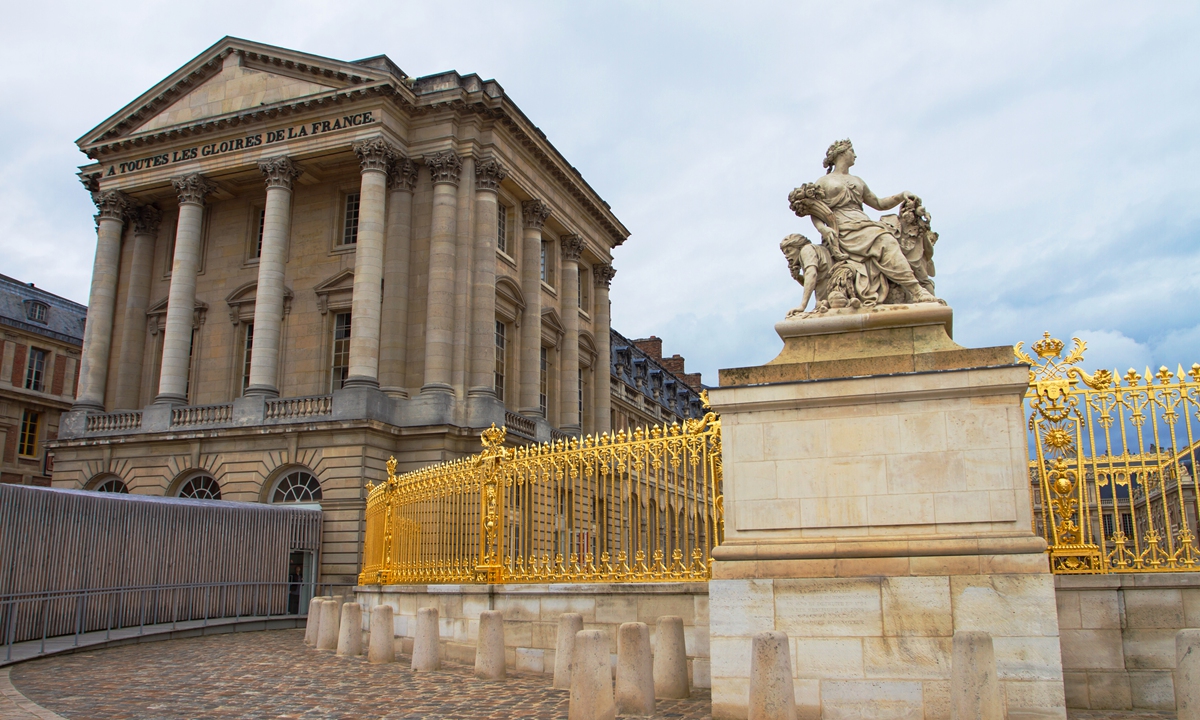
The Palace of Versailles in Paris Photo: VCG
Protection of cultural heritageChina and France have also committed to strengthening bilateral cooperation in the field of cultural heritage protection, restoration and development.
"The fire accident at the world heritage Notre Dame caught the attention of a great many Chinese people who hope to see it restored. It is an honor that Chinese experts can jointly participate in the on-site restoration of Notre Dame in Paris with the French teams," said Yu.
The joint declaration stated that the two countries will cooperate in the protection and restoration of Notre Dame and China's well-known Terracotta Warriors and Horses, the Maoling Mausoleum, where Emperor Wu Di of the Western Han Dynasty (206BC-AD25) lies; and Gongshu Hall, a Ming Dynasty (1368-1644) temple in Northwest China's Shaanxi Province.
Shen Ruiwen, dean at the School of Archaeology and Museology of Peking University, told the Global Times on Monday that the Terracotta Warriors and Horses are the "gold card" of ancient Chinese civilization and a must-see stop for many political leaders from all over the world, including four French presidents.
He added that in 2015 and 2017, China successively carried out cooperative programs with France concerning scientific and technological protection of the Maoling Mausoleum, and signed a protection and research cooperation agreement with Gongshu Hall, which might be the reason the two cultural sites were included in the declaration.
According to Shen, the Maoling Mausoleum, known as the "Pyramid of China," is the largest of the Han Dynasty imperial tombs. The Gongshu Hall was built in the Yongle Emperor period of the Ming Dynasty. More than 100,000 complex and exquisite components, made through superb craftsmanship, were used in its construction.
Language as a foundation
The importance of education exchanges between the two countries has been stressed for years. As early as January 2018, a joint declaration between China and France remarked on cooperation in fields including education and language exchanges, according to the Xinhua News Agency.
Macron's visit to Sun Yat-sen University in Guangzhou, South China's Guangdong Province, on Friday also highlighted the two nations' mutual in-depth cooperation in education. Macron encouraged more young Chinese to learn French and more young French people to learn Chinese, and stressed the importance of mutual learning through academic exchanges in his speech.
According to a survey published by the Education International Cooperation Group based on 2020 data from the French Ministry of Higher Education, Research and Innovation, in 2019 and 2020 students from China made up the second largest group of overseas students in France, second only to Morocco. A total of 29,733 students were studying in the country, a 24 percent increase compared to 2018.
"Both China and France are countries with long histories and abundant culture. Therefore the exchanges in these fields, especially in education, can help boost further mutual learning for young people in both countries," Hugo Mathé, a French student pursuing a PhD in Chinese philosophy at Peking University, told the Global Times.
The 32-year-old, who first started learning to speak Chinese when he became interested in learning tai chi several years ago, is now studying the intriguing differences in the views of Chinese philosopher Zhuangzi and Western philosophers.
"And that's what makes us want to explore each other's cultures," Mathé said. "We have such a different system in many fields such as the humanities and education, and they impact who we are. However, these differences are what cause people to take an interest in a different culture."
Sports feast
After hosting the Winter Olympic and Paralympic Games in 2022, Beijing is passing the torch to Paris for the 2024 Games. This Olympic bond will certainly inspire France and China to create more new opportunities for cooperation in sports.
The joint declaration stated that during the 2024 Games, the two heads of state would like to make sports an important part of bilateral relations, especially in terms of the exchange of young athletes, the development of sports infrastructure and the sharing of experience in the sports industry.
Laurent Bili, the former French ambassador to China, once said that more than 20 young Chinese will go to Paris to participate in the reception of athletes at the Olympic Games through the "Paris 2024 Volunteer Program," according to a report from the Beijing News.
In addition, the China Media Group has been invited to be one of the main broadcasters of the Paris Games. The group will send more than 2,000 production and broadcast personnel to bring the sports feast to millions of viewers in China, CCTV has reported.
